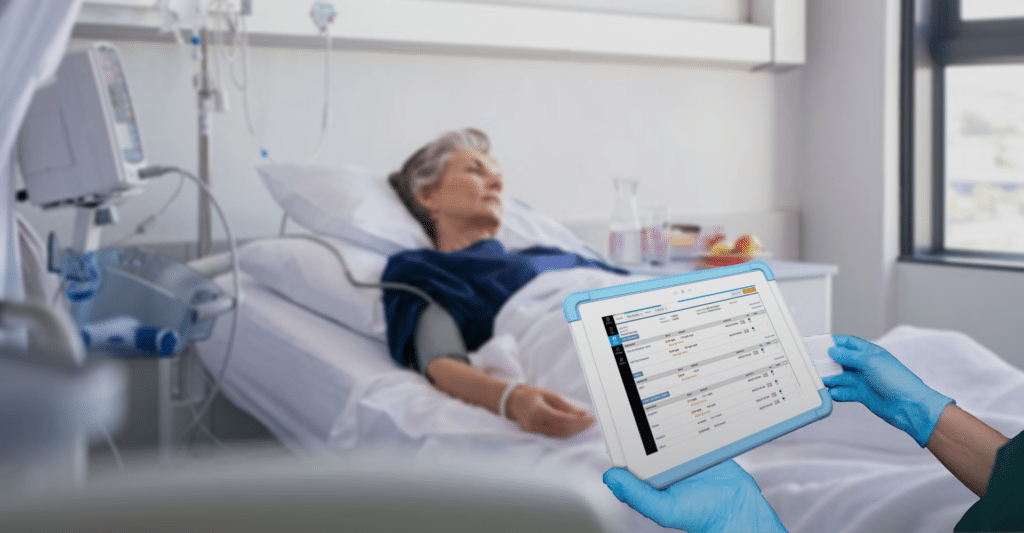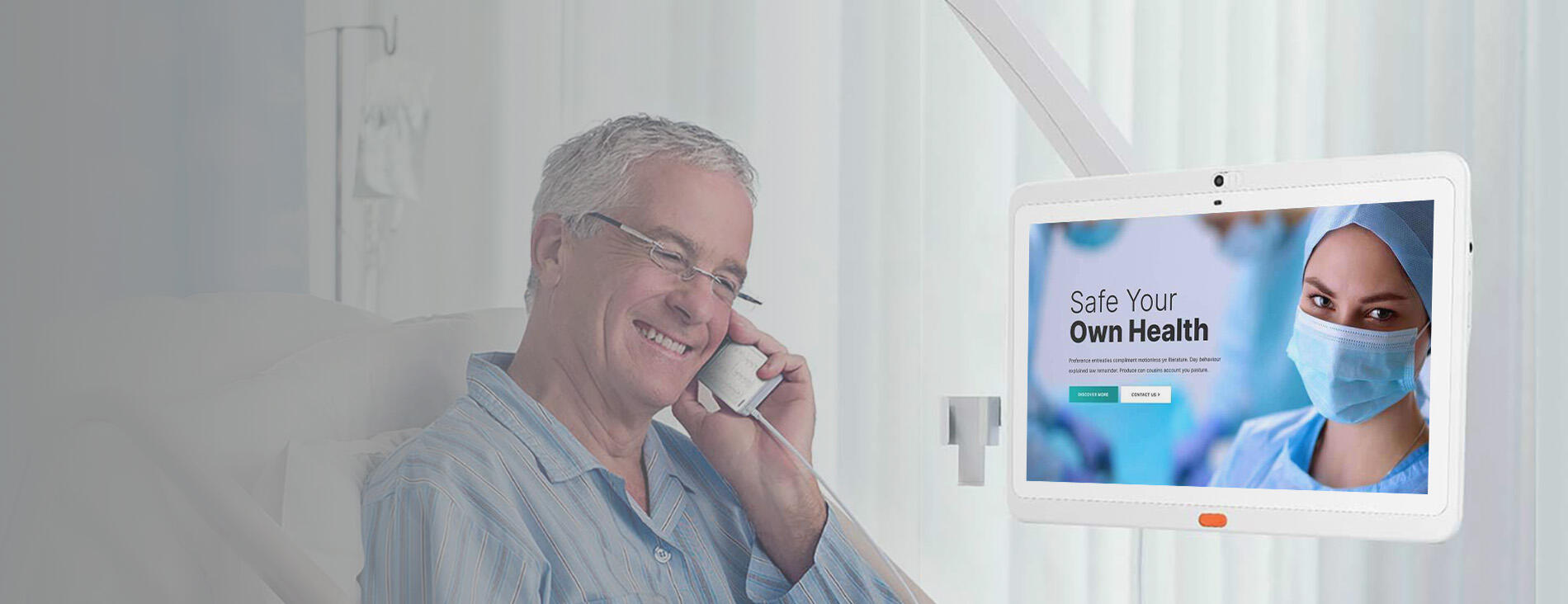What is a medical tablet? ——One article will give you a comprehensive understanding

With the rapid development of science and technology, the digital transformation of the medical industry has become an irreversible trend. In medical scenarios such as hospitals, clinics, and health management centers, a device called a "medical tablet" is gradually becoming an indispensable and important tool in medical work. So, what is a medical tablet? What are its functions and features? What role does it play in medical scenarios? Today, let's take a comprehensive look at this technological product, the medical tablet.
#medicalmonitoringtablet #icumonitor #medicaltabletcomputer #intensivecare uniticumonitor #android11tablet #hospitaltablet #healthcaretablet #healthcaretablets #medicalpc
If you want more details, please contact me on
WhatsApp : +86-13501581295
E-mail ✉️ :[email protected]
Welcome to consult our official website, our website is: https://www.uhopestar.com/
#medicalcomputer #tablethospital #tabletpcmanufacturers #pctabletmedicine #medicaltabletpc #proscribemedicaltabletpc #bestandroidtabletformedicalstudents
What is a medical grade tablet?
Medical tablets are smart devices designed specifically for the medical industry. Based on operating systems such as Android or Windows, they are equipped with professional hardware and software functions to support medical diagnosis, information collection, patient management, and telemedicine, in combination with the actual needs of the medical field.
Unlike traditional consumer-grade tablets, medical tablets not only focus on performance and portability, but also have strict requirements on hygiene, protection, and accuracy to ensure efficient and safe use in medical environments.
Simply put, a medical tablet is a "smart assistant" tailored for medical scenarios.

#besttabletformedicalprofessionals #fanlessmedicalpanelpc #besttabletforhospitaluse #tabletsforhospitaluse #tabletuseinhospitals #tabletshealthcare #medicalandroidtablet
The main purpose of medical tablets
-
Electronic Medical Record (EMR) Management
Medical tablets can be directly connected to the hospital information management system (HIS) or electronic medical record system (EMR). Doctors can use the tablet to view the patient's medical history, examination results and treatment plan in real time, and can also directly enter new diagnostic information.
-
Mobile nursing
Nurses can carry medical tablets to complete daily nursing work in the ward, such as scanning the QR code on the patient's wristband to confirm identity, record vital signs, and distribute medicines, which greatly improves work efficiency and accuracy.
#bestmedicaltabletpc #healthcaretabletpc #medicalpctablet #tabletpcmedical #androidmedicaltablet #besttabletformedicaloffice #medicalofficetablets
-
Telemedicine
Medical tablets support high-definition video calls and data sharing. Doctors can use them to communicate with patients remotely, view diagnostic data in real time, and conduct remote consultations and health guidance.
#tabletsforhealthcareprofessionals #microsoftsurfacehealthcare #medicalmonitoringtablet #medicaltabletpcs #healthcaretabletpcs
-
Medical image viewing
Medical tablets equipped with high-definition large screens and high-performance processors can be used to view and analyze medical images, such as X-rays, CT scan results, ultrasound images, etc., to help doctors make quick diagnoses.
-
Patient Education
Medical tablets can be used to show patients disease knowledge, rehabilitation plans, and surgical simulation animations, allowing patients to more intuitively understand their health conditions and help them recover better.
-
Medical equipment control
Medical tablets can also be connected to various medical devices (such as monitors, electrocardiographs, ventilators, etc.) for real-time data monitoring, equipment parameter adjustment and other functions.
Features and advantages of medical tablets
-
Hygienic and protective design
Medical tablets are usually made of antibacterial materials and seamless design, easy to clean, and resistant to corrosion by alcohol or other disinfectants. The shell is dustproof and waterproof, meeting the strict hygiene standards of hospitals (usually IP65 or higher protection level).
-
High-performance hardware support
The medical tablet is equipped with a high-performance processor, large-capacity memory and high-resolution screen, which supports the operation of complex medical software and can clearly present medical images.
-
One-touch call handle
The medical tablet is equipped with a one-button call handle, which is convenient for patients to call doctors in time. It promotes communication between patients and doctors and saves time.
-
Integrated medical functions
Many medical tablets have built-in barcode scanners, NFC modules, fingerprint recognition and other functions for quick collection of patient data and identification.
-
High data security
Medical data involves patient privacy. Medical tablets use multiple encryption technologies, permission management, and biometric technologies to ensure the security of data transmission and storage, in compliance with international privacy regulations.
-
Wireless connection and portability
The medical tablet supports wireless connections such as Wi-Fi, Bluetooth, 4G/5G, allowing medical staff to access medical data anytime and anywhere. The thin and light design makes it easy to carry, which is very suitable for the mobility needs of medical scenarios.
-
Customizability
Medical tablets can be customized according to the specific needs of medical institutions, such as loading hospital-specific software, adding specific interfaces (such as USB, HDMI), integrating special function modules, etc.

The difference between medical tablets and ordinary tablets
The differences between medical tablets and ordinary commercial-grade tablets are mainly reflected in the following aspects:
| hospital tablet | Ordinary tablet | |
| Application Scenario | Designed for medical use in hospitals and clinics | Ordinary business scenarios (entertainment, office) |
| Material Design | Antibacterial, dustproof, waterproof, easy to clean | Ordinary material, no special protection |
| Functional integration | Barcode scanning, NFC, identity recognition, encryption functions | General functions, no medical-specific modules |
| Performance stability | Can run continuously for 24 hours | Short-term use |
| Data security | Medical data encryption to comply with privacy regulations | General Data Security |
How to choose a medical tablet suitable for hospital use?
With the widespread application of smart devices in the medical industry, medical tablets are playing an increasingly important role in hospitals. Whether it is doctor rounds, patient self-registration, or mobile support for hospital management systems, medical tablets have brought great convenience and efficiency to medical services. So what are the key points to pay attention to when purchasing? This article will take you to learn more.
-
Hardware performance
1.Processor: Medical tablets need to run large medical software, so high-performance processors should be selected, such as ARM Cortex series or higher.
2.Memory and storage: It is recommended to configure more than 2GB of memory and 16GB or more of storage space to ensure smooth multi-tasking.
3.Screen size: The screen of a tablet suitable for medical scenarios is generally between 10 inches and 12 inches, which is easy to carry and can provide clear display.
4.Hidden Camera: Choose a device with a hidden camera to increase privacy for your patients.
5.One-piece call handle: Promotes direct communication efficiency between patients and medical staff. Patients only need to press a button to notify medical staff to help change dressings, remove needles, etc.
-
Stability and reliability
The hospital environment is complex and the equipment needs to run for a long time. Therefore, the tablet needs to have good heat dissipation performance and stability to avoid overheating or downtime affecting work.
-
Disinfection and hygienic design
The medical environment requires strict hygienic conditions. The surface of the tablet should be able to be wiped with conventional medical disinfectants. The shell material should be corrosion-resistant and not easy to leave marks, and it should also be waterproof and dustproof.
-
Compatibility and scalability
Medical tablets need to be seamlessly connected with various hospital systems (such as PACS, LIS, HIS), so the compatibility of operating systems (such as Android, Windows, etc.) is very important. In addition, it is also necessary to support multiple connection methods, such as Wi-Fi, Bluetooth, and USB interfaces, to facilitate the connection of printers, barcode scanners and other devices.
-
Battery life
The work pace of medical staff is tight, and the tablet needs to have long battery life. It is recommended to choose a battery capacity of 5000mAh or above, and support fast charging for user convenience.
-
Customized requirements
The medical industry often has special requirements for equipment, such as interface design, brand logo customization, exclusive hardware configuration, etc. Therefore, it is particularly important to choose a manufacturer that supports OEM/ODM services.
Future development trend of medical tablets
1.AI-assisted diagnosis: Combined with AI technology, medical tablets can analyze patient data in real time and assist doctors in making diagnoses.
2.Higher integration: Future medical tablets may directly integrate functions such as blood pressure monitoring and blood sugar measurement, reducing the use of additional equipment.
3.Cloud medical interconnection: Medical tablets will rely more on cloud storage and data processing to achieve cross-device and cross-hospital information sharing and interconnection.
4.5G telemedicine support: The development of 5G technology will enable medical tablets to play a greater role in remote surgical guidance, ultra-high-definition medical image transmission and other fields.
Summary: The value and selection suggestions of medical tablets
The emergence of medical tablets has greatly improved the efficiency and service quality of the medical industry. It not only helps medical staff to complete their work more efficiently, but also optimizes the patient's medical experience. It is an indispensable technical tool in modern medicine.
If you need to choose a medical tablet, here are some suggestions:
1. Choose professional equipment with medical-grade protection and functions to ensure that it can meet the special needs of medical scenarios.
2. Pay attention to brand and service: Choose manufacturers with experience in the medical industry to ensure after-sales support and customization capabilities of the equipment.
3. Choose size and configuration according to the scenario: There is no need to pursue "the more expensive the better", but to choose cost-effective products based on actual needs.
Medical tablets are changing the way the medical industry operates, bringing more efficient and safer services to medical staff and patients. If you have more questions about medical tablets, please contact us and we will answer you as soon as possible!
Table of Contents
- What is a medical grade tablet?
- The main purpose of medical tablets
- Features and advantages of medical tablets
- The difference between medical tablets and ordinary tablets
- How to choose a medical tablet suitable for hospital use?
- Future development trend of medical tablets
- Summary: The value and selection suggestions of medical tablets


